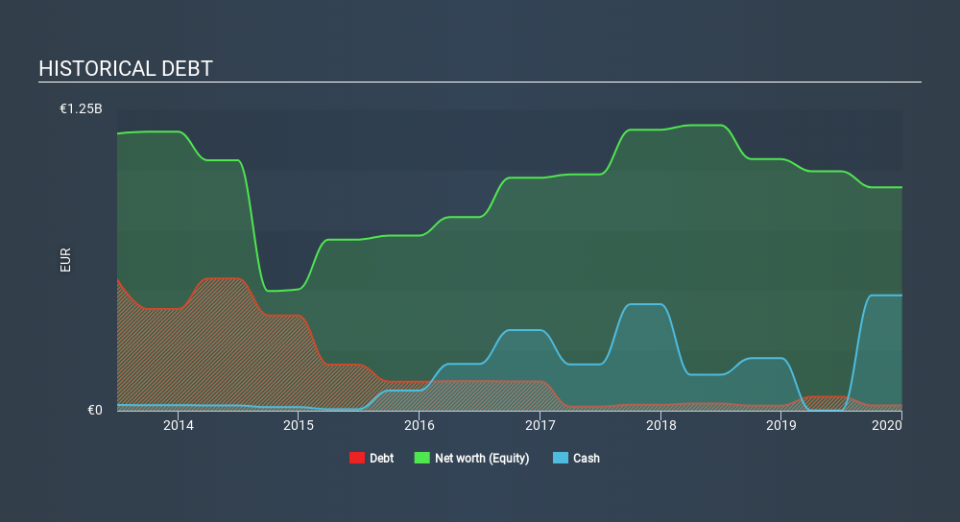These 4 Measures Indicate That EssoF (EPA:ES) Is Using Debt Extensively

Some say volatility, rather than debt, is the best way to think about risk as an investor, but Warren Buffett famously said that 'Volatility is far from synonymous with risk'. So it might be obvious that you need to consider debt, when you think about how risky any given stock is, because too much debt can sink a company. We note that Esso S.A.F. (EPA:ES) does have debt on its balance sheet. But is this debt a concern to shareholders?
Why Does Debt Bring Risk?
Debt assists a business until the business has trouble paying it off, either with new capital or with free cash flow. If things get really bad, the lenders can take control of the business. However, a more frequent (but still costly) occurrence is where a company must issue shares at bargain-basement prices, permanently diluting shareholders, just to shore up its balance sheet. By replacing dilution, though, debt can be an extremely good tool for businesses that need capital to invest in growth at high rates of return. When we examine debt levels, we first consider both cash and debt levels, together.
See our latest analysis for EssoF
What Is EssoF's Debt?
As you can see below, EssoF had €21.7m of debt, at December 2019, which is about the same as the year before. You can click the chart for greater detail. However, its balance sheet shows it holds €478.3m in cash, so it actually has €456.6m net cash.
A Look At EssoF's Liabilities
According to the last reported balance sheet, EssoF had liabilities of €1.72b due within 12 months, and liabilities of €1.27b due beyond 12 months. Offsetting this, it had €478.3m in cash and €724.0m in receivables that were due within 12 months. So its liabilities total €1.79b more than the combination of its cash and short-term receivables.
This deficit casts a shadow over the €217.2m company, like a colossus towering over mere mortals. So we definitely think shareholders need to watch this one closely. After all, EssoF would likely require a major re-capitalisation if it had to pay its creditors today. Given that EssoF has more cash than debt, we're pretty confident it can handle its debt, despite the fact that it has a lot of liabilities in total.
It was also good to see that despite losing money on the EBIT line last year, EssoF turned things around in the last 12 months, delivering and EBIT of €12m. There's no doubt that we learn most about debt from the balance sheet. But it is EssoF's earnings that will influence how the balance sheet holds up in the future. So when considering debt, it's definitely worth looking at the earnings trend. Click here for an interactive snapshot.
Finally, a business needs free cash flow to pay off debt; accounting profits just don't cut it. EssoF may have net cash on the balance sheet, but it is still interesting to look at how well the business converts its earnings before interest and tax (EBIT) to free cash flow, because that will influence both its need for, and its capacity to manage debt. Over the last year, EssoF actually produced more free cash flow than EBIT. There's nothing better than incoming cash when it comes to staying in your lenders' good graces.
Summing up
Although EssoF's balance sheet isn't particularly strong, due to the total liabilities, it is clearly positive to see that it has net cash of €456.6m. And it impressed us with free cash flow of €273m, being 2370% of its EBIT. So although we see some areas for improvement, we're not too worried about EssoF's balance sheet. The balance sheet is clearly the area to focus on when you are analysing debt. But ultimately, every company can contain risks that exist outside of the balance sheet. For instance, we've identified 2 warning signs for EssoF that you should be aware of.
Of course, if you're the type of investor who prefers buying stocks without the burden of debt, then don't hesitate to discover our exclusive list of net cash growth stocks, today.
Love or hate this article? Concerned about the content? Get in touch with us directly. Alternatively, email editorial-team@simplywallst.com.
This article by Simply Wall St is general in nature. It does not constitute a recommendation to buy or sell any stock, and does not take account of your objectives, or your financial situation. We aim to bring you long-term focused analysis driven by fundamental data. Note that our analysis may not factor in the latest price-sensitive company announcements or qualitative material. Simply Wall St has no position in any stocks mentioned. Thank you for reading.

